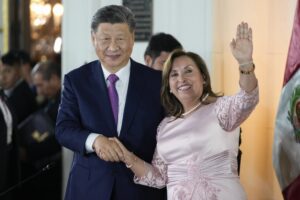Allies of Colombian President Gustavo Petro lost by wide margins in Sunday’s municipal and provincial elections, in what analysts called a sign of growing discontent with the nation’s first left-wing government.
Candidates for the president’s Historical Pact party failed to win mayorships in any of the nation’s main cities and won governorships in only two small provinces along Colombia’s southern border, results released on Sunday night by election officials showed.
Races for governorships were won mostly by candidates from traditional parties on the center and the right, which were beaten by Petro in last year’s presidential election and lost to independent candidates in the last regional elections four years ago.
Some analysts said the outcome threatens Petro’s efforts to get congress to make significant changes to the nation’s health system and its labor laws.
“This sends a message to some lawmakers who were perhaps on the fence about returning to the government, that it’s not going to be in their electoral interests” to support Petro’s proposals, said Will Freeman a fellow for Latin American Studies at the US Council on Foreign Relations. “The winds are changing in Colombia.”
However, others say the president has leverage to get his social and economic changes through congress.
Petro could withhold funds earmarked for cash-strapped municipal and provincial governments to pressure governors into guaranteeing their parties’ congressional members vote for his proposals, said Pedro Medellin, a political analyst in Bogota.
“Colombia is a very centralized nation, where the president has monumental powers,” he said.
Petro won the presidential election after campaigning to make far-reaching economic and social changes that would give the government a greater role in the provision of services like healthcare, education and public transport.
Once in office, he pushed through measures to raise income taxes and cut tax breaks for businesses, and has arranged ceasefires with rebel groups that did not join a 2016 peace deal between the Colombian government and the Revolutionary Armed Forces of Colombia rebels.
However, his economic overhaul has mostly stalled in the congress, where Petro’s coalition fell apart earlier this year amid differences over what changes are needed.
Meanwhile, a lack of security continues to afflict rural parts of Colombia. Kidnappings for ransom and extortion of local businesses have increased, despite efforts by the government to reach ceasefires with groups like the National Liberation Army.
“Despite wins at the [negotiation] table, the actual day-to-day lives of people in these areas has not improved,” said Elizabeth Dickinson, a Colombia expert at the International Crisis Group. “The perception is that security has gotten worse.”
Source: Taipei Times
















